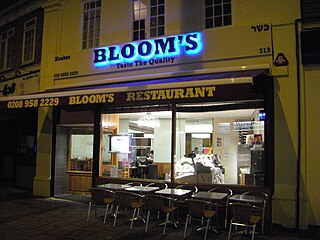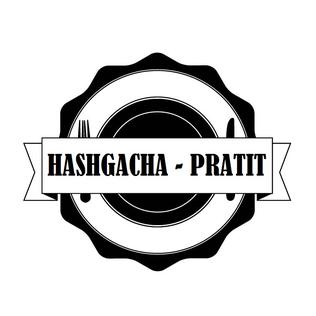Related Research Articles
Kashrut is a set of dietary laws dealing with the foods that Jewish people are permitted to eat and how those foods must be prepared according to Jewish law. Food that may be consumed is deemed kosher, from the Ashkenazi pronunciation of the term that in Sephardic or Modern Hebrew is pronounced kashér, meaning "fit". Food that may not be consumed, however, is deemed treif, also spelled treyf.
A hechsher or hekhsher is a rabbinical product certification, qualifying items that conform to the requirements of Jewish religious law.

A mashgiach or mashgicha is a Jew who supervises the kashrut status of a kosher establishment. Mashgichim may supervise any type of food service establishment, including slaughterhouses, food manufacturers, hotels, caterers, nursing homes, restaurants, butchers, groceries, or cooperatives. Mashgichim usually work as on-site supervisors and inspectors, representing a kosher certification agency or a local rabbi, who actually makes the policy decisions for what is or is not acceptably kosher. Sometimes certifying rabbis act as their own mashgichim; such is the case in many small communities.
Kosher foods are foods that conform to the Jewish dietary regulations of kashrut. The laws of kashrut apply to food derived from living creatures and kosher foods are restricted to certain types of mammals, birds and fish meeting specific criteria; the flesh of any animals that do not meet these criteria is forbidden by the dietary laws. Furthermore, kosher mammals and birds must be slaughtered according to a process known as shechita and their blood may never be consumed and must be removed from the meat by a process of salting and soaking in water for the meat to be permissible for use. All plant-based products, including fruits, vegetables, grains, herbs and spices, are intrinsically kosher, although certain produce grown in the Land of Israel is subjected to other requirements, such as tithing, before it may be consumed.

An appetizing store, typically in reference to Jewish cuisine in New York City, particularly Ashkenazi Jewish cuisine, is a store that sells "food that generally goes with bagels", although appetizings can also be served with a variety of breads. Appetizings include smoked and pickled fish and fish spreads, pickled vegetables, cream cheese spreads and other cheeses.

Kosher style refers to foods commonly associated with Jewish cuisine but which may or may not actually be kosher. It is a stylistic designation rather than one based on the laws of kashrut. In some U.S. states, the use of this term in advertising is illegal as a misleading term under consumer protection laws.
The Islamic dietary laws (halal) and the Jewish dietary laws are both quite detailed, and contain both points of similarity and discord. Both are the dietary laws and described in distinct religious texts: an explanation of the Islamic code of law found in the Quran and Sunnah and the Jewish code of laws found in the Torah, Talmud and Shulchan Aruch.

A kosher restaurant or kosher deli is an establishment that serves food that complies with Jewish dietary laws (kashrut). These businesses, which also include diners, cafés, pizzerias, fast food, and cafeterias, and are frequently in listings together with kosher bakeries, butchers, caterers, and other similar places, differ from kosher-style businesses in that they operate under rabbinical supervision, which requires the observance of the laws of kashrut, as well as certain other Jewish laws, including the separation of meat and dairy.
Civil laws regarding kashrut are found in several countries. Advertising standards laws in many jurisdictions prohibit the use of the phrase "kosher" in a product's labelling, unless it can be shown that the product conforms to Jewish dietary laws; however, the legal qualifications for conforming to Jewish dietary laws are often defined differently in different jurisdictions.
Gallagher v. Crown Kosher Super Market of Massachusetts, Inc., 366 U.S. 617 (1961), is a United States Supreme Court case that declared that a kosher butcher store had to abide by the state laws that banned them from selling on Sunday.

McDonald's Israel is the Israeli master franchise of the fast food restaurant chain McDonald's. Currently operated and licensed by Alonyal Limited, McDonald's Israel is the largest of Israel's burger chains with a 60% market share. It was the first Israeli outlet to be opened in 1993 and a major competitor of the local restaurant chain Burger Ranch. The world's first kosher McDonald's was opened in Mevaseret Zion in October 1995. After a sales decline attributed to consumer boycotts as part of the BDS movement, McDonald's Coporation announced in 2024 that it would buy Alyonal pending regulatory approval.

Seven Mile Market is the largest kosher supermarket in the United States. The store, which is located in Pikesville, Maryland, was established in 1988, and has been in its current location since November 16, 2010. The store, which is under the kashrut supervision of the Star-K, includes a floral department, and formerly included a pharmacy and a eyeware store.

On 9 January 2015, Amedy Coulibaly, armed with a submachine gun, an assault rifle, and two Tokarev pistols, entered and attacked a Hypercacher kosher supermarket in Porte de Vincennes in Paris, France. There, Coulibaly murdered four Jewish hostages and held fifteen other hostages during a siege in which he demanded that the Kouachi brothers not be harmed. The siege ended when police stormed the supermarket, killing Coulibaly. The attack and hostage crisis occurred in the wake of the Charlie Hebdo shooting two days earlier, and concurrently with the Dammartin-en-Goële hostage crisis in which the two Charlie Hebdo gunmen were cornered.
A kosher certification agency is an organization or certifying authority that grants a hechsher to ingredients, packaged foods, beverages, and certain materials, as well as food-service providers and facilities in which kosher food is prepared or served. This certification verifies that the ingredients, production process including all machinery, and/or food-service process complies with the standards of kashrut as stipulated in the Shulchan Arukh, the benchmark of religious Jewish law. The certification agency employs mashgichim to make periodic site visits and oversee the food-production or food-service process in order to verify ongoing compliance. Each agency has its own trademarked symbol that it allows manufacturers and food-service providers to display on their products or in-store certificates; use of this symbol can be revoked for non-compliance. Each agency typically has a "certifying rabbi" who determines the exact kashrut standards to be applied and oversees their implementation.

The Jewish-American patronage of Chinese restaurants became prominent in the 20th century, especially among Jewish New Yorkers. It has received attention as a paradoxical form of assimilation by embracing an unfamiliar cuisine that eased the consumption of non-kosher foods.

American Jewish cuisine comprises the food, cooking, and dining customs associated with American Jews. It was heavily influenced by the cuisine of Jewish immigrants who came to the United States from Eastern Europe around the turn of the 20th century. It was further developed in unique ways by the immigrants and their descendants, especially in New York City and other large metropolitan areas of the northeastern U.S.

Hashgacha Pratit (השגחה-פרטית) is an independent, Israel-based organization with both female and male clergy that self-describes as providing an alternative form of Orthodox Rabbinical authority and social activism group dedicated to challenging the monopoly of the Chief Rabbinate of Israel over religious ceremonies and practices, through the provision of private religious ceremonies. Founded in 2012 by Rabbi Aaron Leibowitz in Jerusalem, Israel, it offers alternative halachic services in life-cycle events, rabbinical training, and other courses in religious education. It has provided private kashrut supervision for restaurants, worked on raising public awareness and finding loopholes in the laws to circumvent the Chief Rabbinate's monopoly, first regarding Kashrut, by leading the movement to open the kosher food market to competition, and today regarding Orthodox wedding ceremonies.
Kosher by ingredient is an approach to observing the laws of kashrut that determines whether a food is kosher or not based on ingredient, rather than by the presence of a hechsher. This approach has fallen out of favor with Orthodox Jews, but is practiced by many Conservative Jews as well as by some Reform Jews and Reconstructionist Jews.
Criticism of kashrut is criticism of or opposition to the laws of kashrut and/or dislike of kosher foods. Criticism of kashrut can either come from non-Jews or it can come from Jews who don't keep kosher, and it may or may not be motivated by antisemitism. In some European countries, kosher slaughter is either banned or restricted by law, often because nationalists or animal rights activists object to the practice. Certain aspects of kashrut have been alleged to promote sectarianism or racism, a claim that is rejected by Jews who keep kosher. Right-wing extremists sometimes criticize kashrut due to their belief in antisemitic canards and antisemitic conspiracy theories. In Classical Reform Judaism, the keeping of kosher has been discouraged, based on its belief that the keeping of Kosher is an unhelpful vestige of the past. In the Soviet Union, the keeping of Kosher was discouraged, due to the anti-religious and antisemitic policies of the Soviet government, and the anti-religious views of secular Jewish Communists.
References
- ↑ "Discounter nicknamed 'Kosher Costco' plans Long Island entry". Newsday. 13 May 2022. Retrieved 2022-06-06.
- ↑ "New 2-story H-E-B in Meyerland to open next week". KTRK-TV . Retrieved 2022-09-24.
- ↑ Buchanan, Rose Troup (9 January 2015). "Paris attacks: Armed gunman takes hostage in Kosher grocery shop in east of city". Independent. Retrieved 9 January 2015.
- ↑ "Nation's largest kosher market opens in Pikesville". The Baltimore Sun . Retrieved 2022-06-06.
- ↑ ""Super" kosher market serves Jews of Panama City". San Diego Jewish World . Retrieved 2022-06-08.